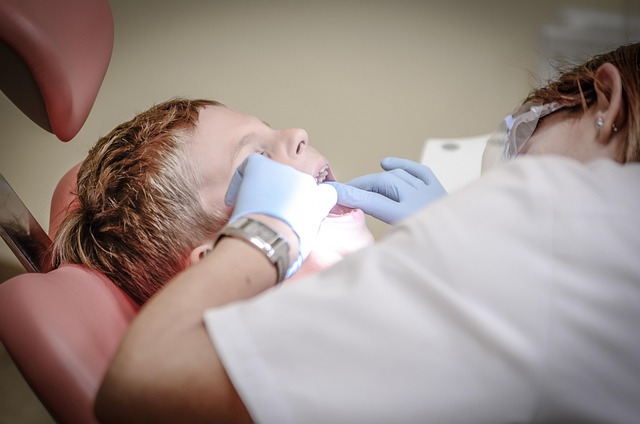Affordable IT Solutions for McAllen Dental Practices

Assessing IT needs for dental offices in McAllen, TX requires a strategic balance between efficiency…….
In the modern era, where technology plays a pivotal role in healthcare delivery, ensuring efficient and secure IT systems is crucial for dental practices. This article delves into the significance of IT support specifically tailored for dental offices in McAllen, Texas, exploring its various aspects, benefits, and future potential. McAllen’s dental community, like many others across the globe, faces unique challenges and opportunities when it comes to adopting and integrating technology to enhance patient care and administrative efficiency. This piece aims to provide a comprehensive understanding of this critical topic, offering insights that can shape the digital future of local dental practices.
Definition: IT support for dental offices in McAllen, TX, refers to the specialized services and solutions designed to meet the unique needs of dental practices located in this specific geographic area. It encompasses a range of activities aimed at ensuring the smooth operation of computer systems, networks, and software applications used within dental clinics.
Core Components:
Hardware Maintenance: This involves regular servicing and repair of computers, servers, printers, and other IT equipment to minimize downtime. In a fast-paced dental environment, reliable hardware is essential for efficient patient record management and treatment planning.
Network Management: Dental offices rely on stable and secure networks to facilitate communication between staff members and to access electronic health records (EHRs). IT support includes network monitoring, troubleshooting, and optimization to ensure optimal performance.
Software Implementation and Training: Dental practices use various software applications for scheduling appointments, managing patient records, billing, and accounting. IT professionals assist in selecting suitable software, implementing it, and providing training to staff to ensure efficient adoption.
Data Security and Backup: Protecting sensitive patient information is paramount. IT support includes setting up robust security protocols, encrypting data, regularly backing up critical files, and ensuring compliance with healthcare data privacy regulations like HIPAA (Health Insurance Portability and Accountability Act).
Cybersecurity Measures: Dental offices are increasingly vulnerable to cyberattacks due to their reliance on digital systems. IT support involves implementing firewalls, antivirus software, intrusion detection systems, and regular security audits to safeguard networks and patient data.
Historical Context: The concept of IT support for dental offices has evolved significantly over the past few decades. In the early days, dental practices often had minimal computerization, relying on manual record-keeping and basic calculators. However, with advancements in healthcare technology and increasing patient expectations, the need for efficient digital systems became apparent. The mid-1990s saw a significant push towards computerizing dental practices, leading to the adoption of EHRs and practice management software. Today, IT support is not just about maintaining systems but also about maximizing their potential to streamline workflows, improve patient care, and enhance business operations.
International Influence: The concept of IT support for dental offices has spread globally, with various countries adopting unique approaches based on their healthcare systems and technological readiness. McAllen’s dental community benefits from international best practices while also contributing to a diverse global knowledge base.
Regional Variations:
North America: Leading North American countries like the United States and Canada have made significant strides in digitalizing dental practices. The US, in particular, has a robust ecosystem of dental IT solutions providers, offering advanced software and support services. McAllen’s dental offices can leverage these advancements while also contributing to ongoing research and development.
Europe: European countries have implemented comprehensive healthcare systems with strong digital infrastructure. Dental practices across Europe often utilize cloud-based solutions for EHRs and practice management, ensuring seamless data sharing and interoperability.
Asia Pacific: This region, including countries like Japan and South Korea, is known for its advanced technology adoption rates. Dental IT in these nations focuses on precision medicine and robotic dentistry, pushing the boundaries of what’s possible in dental care.
Key Trends Shaping Global Dental IT:
Teledentistry: The rise of telemedicine has opened new avenues for dental care delivery, especially in rural areas or regions with limited access to dental professionals. It involves using video conferencing and digital imaging technology to provide remote consultations and diagnoses.
Artificial Intelligence (AI) and Machine Learning (ML): AI and ML algorithms are revolutionizing dental practice by assisting in diagnosis, treatment planning, and even surgical procedures. These technologies enable dental professionals to make more accurate decisions based on data analysis.
Interoperability: The ability of different healthcare systems and software applications to communicate and share patient data seamlessly is a significant global trend. This ensures better continuity of care and facilitates research by providing access to large datasets.
Market Dynamics: The dental IT market, both globally and locally in McAllen, TX, is experiencing steady growth. According to a 2022 report by ResearchAndMarkets.com, the global dental IT market size was valued at USD 3.5 billion in 2021 and is projected to grow at a CAGR of 8.5% from 2022 to 2029. This growth is driven by factors like increasing digital literacy, rising healthcare spending, and the need for efficient record-keeping.
Investment Patterns: Dental practices in McAllen, as well as across the country, are investing in IT infrastructure to modernize their operations and improve patient experiences. The American Dental Association (ADA) reports that dental offices with more advanced technology systems tend to have higher revenue and better operational efficiency. This trend highlights the economic benefits of embracing digital transformation.
Role in Economic Systems: IT support for dental offices contributes to local and national economies in several ways:
Job Creation: The dental IT sector generates employment opportunities, from software developers and engineers to technical support staff and healthcare consultants.
Revenue Generation: Efficient IT systems enable dental practices to reduce administrative burdens, allowing more time for patient care and potentially increasing revenue through improved service delivery.
Healthcare Cost Reduction: Digitalization can lead to reduced errors, faster diagnosis, and better treatment outcomes, ultimately lowering healthcare costs for patients and insurance providers.
Significance of Tech in Dental IT: Technological advancements have revolutionized dental practice management and patient care. From digital imaging to robotic surgery, these innovations enhance precision, efficiency, and accessibility in dentistry.
Key Advancements and Their Impact:
Digital Imaging and Radiography: Digital X-rays reduce radiation exposure and provide instant, high-resolution images for diagnosis and treatment planning. This technology has become a cornerstone of modern dental practice, enabling faster, more accurate detection of oral health issues.
Electronic Health Records (EHRs): EHR systems replace traditional paper charts, offering numerous benefits such as improved data security, easy access to patient history, and enhanced interoperability with other healthcare providers. EHRs also facilitate research by providing a wealth of anonymized patient data for analysis.
Teledentistry Platforms: These platforms enable remote consultations and diagnoses, expanding access to dental care, especially in underserved areas. Teledentistry has gained prominence during the COVID-19 pandemic as a safe alternative to in-person visits.
Dental Robotics: Robotic dentistry assists in precise surgeries, allowing for more accurate procedures, faster healing times, and reduced patient discomfort. Robots can also handle repetitive tasks, freeing up dental professionals to focus on complex procedures and patient care.
Artificial Intelligence (AI): AI algorithms analyze patient data to predict oral health issues, suggest personalized treatment plans, and improve diagnostic accuracy. Chatbots and virtual assistants are also being used for initial patient consultations and appointment scheduling.
Key Policies and Regulations: The IT landscape in healthcare, including dental practices, is shaped by various policies and regulations aimed at ensuring data privacy, security, and interoperability:
HIPAA (Health Insurance Portability and Accountability Act): This US legislation sets standards for protecting sensitive patient information. Dental offices must implement security measures to safeguard patient data and ensure compliance with HIPAA’s privacy and security rules.
GDPR (General Data Protection Regulation): In Europe, GDPR governs the processing of personal data, including patient information. Dental practices operating in the EU or dealing with European patients must comply with these regulations, ensuring transparency and user consent for data collection and processing.
OIG (Office of Inspector General) Guidelines: In the US, OIG provides guidelines on anti-kickback laws, false claims, and other regulatory issues related to healthcare IT. Dental practices must be mindful of these rules to avoid legal and financial penalties.
Interoperability Standards: Initiatives like HL7 (Health Level Seven International) and FHIR (Fast Healthcare Interoperability Resources) establish standards for exchanging health data electronically. These standards are crucial for ensuring that dental IT systems can communicate with other healthcare providers’ systems, promoting better care coordination.
Main Challenges:
Cost of Implementation: Setting up and maintaining robust IT infrastructure can be expensive, especially for smaller dental practices in McAllen. The initial investment in hardware, software, and training may deter some offices from adopting digital solutions.
Technical Complexity: Integrating various software applications and ensuring they work seamlessly together can be challenging. Dental practices often require specialized IT professionals to navigate this complexity and provide ongoing support.
Data Security Concerns: Despite advancements in cybersecurity, dental practices remain vulnerable to cyberattacks. Protecting sensitive patient data from malicious threats and unauthorized access is a constant challenge.
Criticisms and Proposed Solutions:
Overreliance on Technology: Some critics argue that excessive reliance on IT systems may lead to decreased face-to-face interaction between patients and dental professionals. However, the solution lies in finding a balance; using technology to enhance, not replace, human connection.
Interoperability Issues: The lack of seamless data sharing between different healthcare systems is a significant criticism. Proposed solutions include adopting standardized interoperability protocols and encouraging collaboration among healthcare providers to ensure better information exchange.
Digital Divide in Rural Areas: In McAllen and surrounding rural regions, access to high-speed internet and digital resources may be limited. Expanding broadband infrastructure and providing IT support to these areas are essential to bridge the digital divide.
Case Study 1: Modern Dental Care in McAllen
Practice Profile: Dr. Sarah Johnson’s dental practice, located in the heart of McAllen, adopted a comprehensive IT solution to streamline its operations and improve patient care.
Implementation: They partnered with a local IT services provider to implement a cloud-based EHR system, integrated with dental software for practice management. The team also provided staff training and ongoing support.
Outcomes: The new system reduced paper usage by 80%, improved appointment scheduling accuracy, and enabled secure remote access to patient records. Dr. Johnson reported increased patient satisfaction due to faster service and more efficient communication.
Case Study 2: Rural Dental Clinic in South Texas
Setting: A small dental clinic in a rural community near McAllen faced challenges providing care to a largely uninsured population.
Strategy: They leveraged teledentistry, utilizing video conferencing technology to connect patients with dental specialists located in urban areas. IT support was crucial for setting up secure videoconferencing platforms and ensuring patient data privacy during remote consultations.
Impact: The initiative increased access to dental care for underserved communities, allowing for early disease detection and treatment. It also reduced travel costs for both patients and providers, fostering a more sustainable model of care.
Emerging Trends:
AI-Powered Diagnostics: AI algorithms will continue to play a significant role in dental diagnostics, with advancements in deep learning techniques leading to more accurate and faster diagnoses.
Remote Monitoring: Dental practices may adopt remote monitoring technologies to track patient oral health outcomes, enabling personalized care plans and early intervention.
Blockchain for Data Security: Blockchain technology offers enhanced data security and interoperability, potentially revolutionizing dental record-keeping and insurance claims processing.
Strategic Considerations:
Cloud Computing: Adopting cloud-based solutions for EHRs and practice management will become increasingly common, offering cost-effectiveness and improved accessibility to dental practices of all sizes.
Cybersecurity Enhancements: As cyber threats evolve, dental offices must invest in advanced cybersecurity measures, including regular penetration testing and employee training to prevent data breaches.
Collaboration and Interoperability: Encouraging collaboration among healthcare providers and adopting standardized interoperability protocols will ensure better information exchange, leading to improved patient care and research opportunities.
IT support for dental offices in McAllen, TX, is a dynamic field that plays a pivotal role in modernizing healthcare delivery. The global impact of technological advancements has led to significant improvements in dental practice management, patient care, and overall operational efficiency. By embracing IT solutions, dental practices can enhance their competitive edge, improve patient outcomes, and contribute to the broader healthcare ecosystem.
The future of dental IT in McAllen holds immense potential, with emerging trends focusing on AI, remote monitoring, and enhanced data security. As technology continues to evolve, dental professionals who stay informed and proactive will be well-positioned to navigate this digital landscape, ensuring they provide the best possible care to their patients.
Q: How does IT support benefit small dental practices in McAllen?
A: IT support tailored for small dental practices helps them compete with larger clinics by providing efficient and cost-effective solutions. It streamlines administrative tasks, improves patient care, and enhances operational productivity, ultimately contributing to their long-term success.
Q: Are there any specific cybersecurity threats unique to dental offices?
A: Dental practices are susceptible to various cyber threats, including ransomware attacks, phishing schemes, and data breaches. These risks can compromise sensitive patient information and disrupt practice operations. Regular security audits, employee training, and robust backup strategies are essential for mitigating these threats.
Q: How can dental practices ensure their IT systems comply with healthcare regulations?
A: Dental practices must stay updated on relevant policies like HIPAA (in the US) and GDPR (in Europe). Implementing security measures, conducting regular risk assessments, and ensuring staff awareness of regulatory requirements are crucial for compliance. Working with IT professionals who specialize in healthcare can also help navigate these complexities.
Q: What role does cloud computing play in dental IT?
A: Cloud computing offers dental practices cost-effective and scalable solutions for storing and managing patient data. It improves accessibility, allowing dentists and their teams to access records from anywhere, and facilitates seamless collaboration among healthcare providers.

Assessing IT needs for dental offices in McAllen, TX requires a strategic balance between efficiency…….

McAllen, TX dental offices now benefit from 24/7 care, thanks to specialized IT support tailored to…….

McAllen, Texas dental offices are adopting cloud-based software for enhanced efficiency, security, a…….

Dental offices in McAllen, Texas, face heightened cybersecurity risks due to sensitive patient data……..

Dental equipment maintenance contracts in McAllen TX ensure optimal dental practice operations by pr…….

In McAllen, TX, assessing dental office needs is vital for enhancing patient care and operational ef…….

Dental equipment maintenance contracts in McAllen TX are essential for small practices, reducing equ…….

Securing patient data in McAllen, TX dental offices is critical due to increasing digital reliance……..

Mobile dental practices in McAllen, TX, are reshaping oral healthcare through advanced technology, i…….